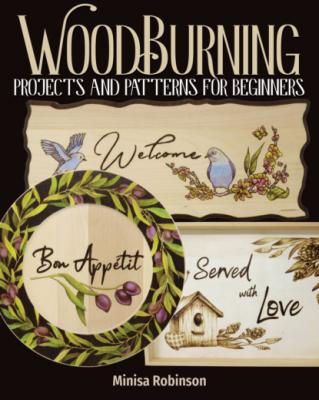Woodburning Projects and Patterns for Beginners. Minisa Robinson
Читать онлайн.| Название | Woodburning Projects and Patterns for Beginners |
|---|---|
| Автор произведения | Minisa Robinson |
| Жанр | Сделай Сам |
| Серия | |
| Издательство | Сделай Сам |
| Год выпуска | 0 |
| isbn | 9781607657828 |
This point is designed to transfer an image onto the wood using an iron-on based paper. However, here are some other uses for the point.
Lines. This is an unusual way to use this point, but it produces an interesting effect. By using the side of the point and slowly rolling it forward like a tire, you can burn straight lines.
Shading. Place the point flat on the wood and slowly burn back-andforth or in a circular motion to create soft shading.
Overlapping Circles. Press the point straight onto the wood and overlap the circles to create an interesting background or texture.
Partial Circles. To create a crescent shape, just burn with the outer edge of the point.
Versa-Tool: Hot Knife
This point is used mainly for cutting thin objects and doesn’t transfer much heat. It will cut into the wood but doesn’t leave a burn mark.
Versa-Tool: Stamping Points
Hot Stamps. These points each come with a unique shape that can be burned into the wood.
Woodburning Points: Razertip Overview
The Razertip woodburning tool comes as a base where you can purchase interchangeable pens separately. There is a huge variety of pens and nibs to choose from, and many of them are specialty-based for specific projects. Here are a few pens that are popular for general woodburning and work well for a wide range of subjects. These are some of my favorite pens, but I encourage you to experiment with these and other points to learn what works best for you.
Razertip: 1 .5 mm Ball Stylus
Text. Use this small point to draw text, much like you’d use a pencil. Avoid excessive overburn markings by turning the heat dial to a lower setting.
Lines. You can easily draw in straight lines with this point, but again, use a lower temperature to create lines without overburn.
Stippling. This is a great point for fine stippling due to its smaller point size.
Varying Dots. You can create different-sized dots by placing the point on the wood for shorter or longer periods of time. Keep in mind that the longer the point is on the wood, the more likely you’ll get overburn marks.
Razertip: 3 mm Ball Stylus
The 3 mm Ball Stylus can do everything that the smaller 1.5 mm Ball Stylus does, but it’s a bit bigger and is well suited to larger projects. It is also great for blocking in areas as shown above.
Razertip: Medium Spear Shader
Fine Lines and Crosshatching. Turn the pen over and use the sharp edge of the point to create fine lines and crosshatching.
Angles. Lightly press the upper part of the point against the wood to create small angled shapes.
Solid Black. Lay the point flat on the wood and slowly move the point back and forth to create a rich, solid black.
Shading. This is a great point for creating soft shading. Just keep the point level at all times, because you can create an accidental hard line if you rock the point too much to one side or the other.
Razertip: Medium Spoon Shader
Fur. Create soft or crisp fur strokes by burning back-andforth motions with the upper point of the shading tip.
Dots. Gently press the point flat into the wood to create uniform oval-shaped dots.
Shading. This is also a great point for creating soft shading. You don’t need to keep the point flat all the time; it’s okay to rock back and forth without creating harsh edge lines.
Solid Black. Lay the point flat on the wood and slowly move the point back and forth to create a rich, solid black.
Text. You can also use this point to create text with soft edges, as well as sharp lines and crosshatching.
Helpful
